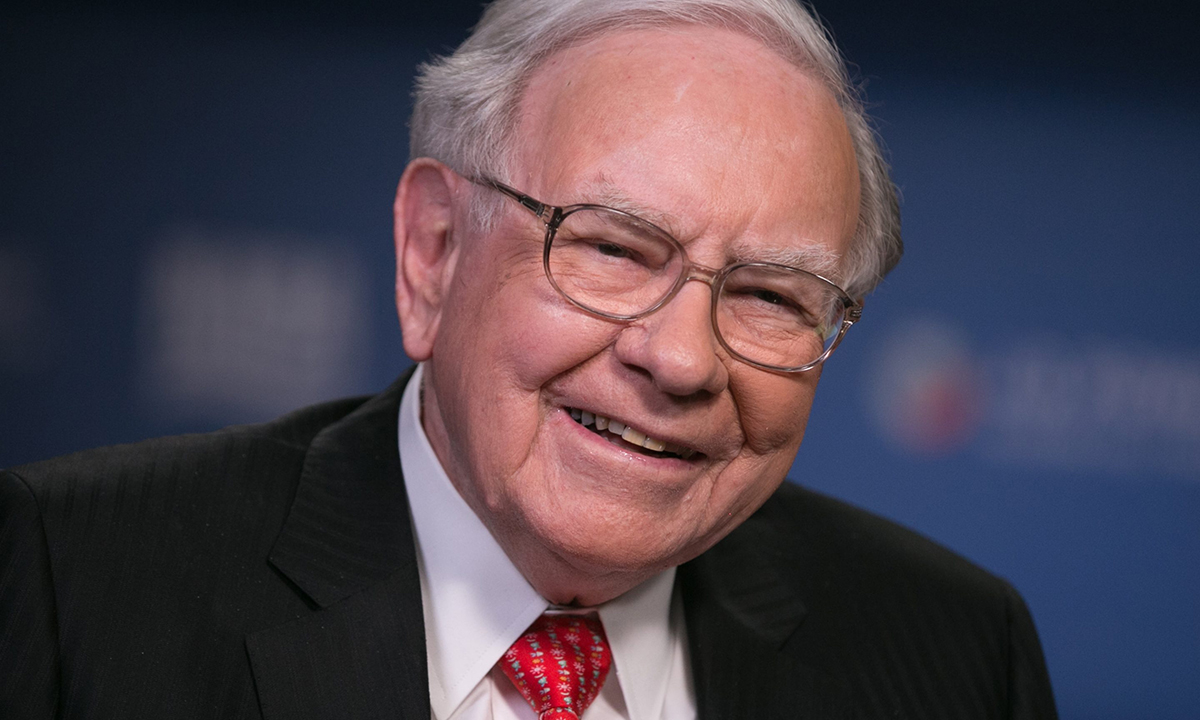
如今的新聞頭條常有報道,美國最著名公司的首席執(zhí)行官們每天天不亮就起床,打造“極度硬核”的工作環(huán)境,這時讀到像沃倫·巴菲特這樣的首席執(zhí)行官的工作方式,不由讓人耳目一新——他做交易的方式?jīng)]有那么狂熱:沒有電腦,開最少的會議,確保充足的休息。
當(dāng)然,巴菲特也不是懶漢。剛剛于今年8月30日過了93歲生日的巴菲特被譽為有史以來最成功的投資者之一,根據(jù)彭博億萬富翁指數(shù)(Bloomberg Billionaires Index),他目前的身價約為1,200億美元,在世界富豪榜上排名第七位(盡管他的凈資產(chǎn)和排名每天都不一樣)。他的伯克希爾-哈撒韋公司(Berkshire Hathaway)的業(yè)務(wù)范圍廣泛綜合,該公司在今年的《財富》美國500強排行榜中排名第七位,擁有近70家子公司,包括保險公司、珠寶商以及冰淇淋連鎖店等等。這些年來,他為投資者賺了很多錢。
但在閱讀2005年《華爾街日報》(Wall Street Journal)的一篇專題文章時,我最羨慕的是他花在“閱讀和思考”上的時間,以及他可以關(guān)機離線、不參加自己不感興趣的會議的能力。這讓他能夠深度工作,而不用受到現(xiàn)代辦公室里無處不在的持續(xù)干擾(電子郵件、Slack消息、可能以電子郵件形式召開的會議等),這是很多人(包括我自己)都渴望不可得的。所有這些清晰的精神空間讓他可以相信自己的直覺。“我創(chuàng)造了一個良好的環(huán)境。”他對《華爾街日報》表示。“我所要做的就是思考,不受別人的影響。”
對于像巴菲特這樣高知名度的人來說,他的日常生活顯得出奇低調(diào)。沒有凌晨四點的冷凍療法、營養(yǎng)品養(yǎng)生或每日身體脂肪掃描。巴菲特稱,他每天早上6點45分起床(很合理),讀讀新聞,再去辦公室,有時甚至是在股市開盤后才去辦公室。眾所周知,他的飲食里也不包括其他首席執(zhí)行官熱衷的富含營養(yǎng)的奶昔或一盤一盤的西蘭花,而是麥當(dāng)勞(McDonald’s)、冰雪皇后(Dairy Queen)和罐裝可樂。在空閑時間,他會讀書、打橋牌以保持思維敏捷,還會彈彈尤克里里。
“我覺很多。我喜歡睡覺。”巴菲特在2017年接受美國公共廣播公司《新聞一小時》(PBS NewsHour)的采訪(這篇采訪被廣為引用)時說,“我一般每晚睡八個小時,而且——不,我可不想凌晨四點就去上班。”
他聽起來是一位相當(dāng)不錯的老板,尤其是對那些鄙視微觀管理的人而言。《華爾街日報》的報道稱:“他能夠迅速做出投資決策,避開會議和顧問,避開既定程序,也不需要經(jīng)理經(jīng)常匯報。”
這篇故事還講道:“巴菲特告訴他的業(yè)務(wù)部門負(fù)責(zé)人,不要為他準(zhǔn)備任何特別報告。”其他一些出版物詳細介紹了他去中心化的放手式管理,這在美國的大公司中獨一無二。“我們幾乎把權(quán)力下放到了放棄權(quán)力的地步。”巴菲特說。《財富》雜志的資深記者、巴菲特的朋友卡羅爾·盧米斯在1988年寫道,他喜歡讓員工高高興興的。“‘優(yōu)秀的企業(yè)由優(yōu)秀的人經(jīng)營’,這是他作為首席執(zhí)行官想要看到的景象。”她寫道。
《華爾街日報》的這篇報道已經(jīng)發(fā)表快20年了,所以在此期間,事情很可能發(fā)生了變化(巴菲特從那以后沒有給任何人發(fā)過電子郵件,這可能嗎?)但巴菲特是按照習(xí)慣行事的人,巴菲特的密友、微軟(Microsoft)的聯(lián)合創(chuàng)始人比爾·蓋茨在1996年寫道。他一直保持著同樣的生活習(xí)慣。
“我很欣賞沃倫的一個習(xí)慣是,他的日程表上沒有會議。”蓋茨寫道,“他擅長說不……他喜歡坐在辦公室里讀書和思考。除此之外,他也會做一些其他事情,但不太多。”
作為一名在Slack已經(jīng)接管辦公室通訊和超高速連接已經(jīng)成為常態(tài)的環(huán)境中成長起來的千禧一代,因為各種各樣的原因,巴菲特非數(shù)字化的復(fù)古工作方式對我充滿了吸引力。當(dāng)然,作為一名記者,我需要打電話,確保自己了解最新的新聞和全球突發(fā)事件(事實上,巴菲特在他的工作時間里一直第一時間了解最新的新聞)。而且,沒有巴菲特雄厚的資產(chǎn)作為保障,也很少有人可以像他那樣保持不插電的狀態(tài)。
但他的方法提醒了我們,我們許多人真正渴望的是:在我們覺得充實的職業(yè)中做有意義的工作,并且在工作允許的情況下,對越來越占用我們注意力的噪音加以限制。
“我告訴學(xué)生們,找工作時要找你不需要工作時也愿意做的工作。”巴菲特在2017年接受美國公共廣播公司采訪時說,“我的意思是,就是這么簡單。”(財富中文網(wǎng))
譯者:Agatha
如今的新聞頭條常有報道,美國最著名公司的首席執(zhí)行官們每天天不亮就起床,打造“極度硬核”的工作環(huán)境,這時讀到像沃倫·巴菲特這樣的首席執(zhí)行官的工作方式,不由讓人耳目一新——他做交易的方式?jīng)]有那么狂熱:沒有電腦,開最少的會議,確保充足的休息。
當(dāng)然,巴菲特也不是懶漢。剛剛于今年8月30日過了93歲生日的巴菲特被譽為有史以來最成功的投資者之一,根據(jù)彭博億萬富翁指數(shù)(Bloomberg Billionaires Index),他目前的身價約為1,200億美元,在世界富豪榜上排名第七位(盡管他的凈資產(chǎn)和排名每天都不一樣)。他的伯克希爾-哈撒韋公司(Berkshire Hathaway)的業(yè)務(wù)范圍廣泛綜合,該公司在今年的《財富》美國500強排行榜中排名第七位,擁有近70家子公司,包括保險公司、珠寶商以及冰淇淋連鎖店等等。這些年來,他為投資者賺了很多錢。
但在閱讀2005年《華爾街日報》(Wall Street Journal)的一篇專題文章時,我最羨慕的是他花在“閱讀和思考”上的時間,以及他可以關(guān)機離線、不參加自己不感興趣的會議的能力。這讓他能夠深度工作,而不用受到現(xiàn)代辦公室里無處不在的持續(xù)干擾(電子郵件、Slack消息、可能以電子郵件形式召開的會議等),這是很多人(包括我自己)都渴望不可得的。所有這些清晰的精神空間讓他可以相信自己的直覺。“我創(chuàng)造了一個良好的環(huán)境。”他對《華爾街日報》表示。“我所要做的就是思考,不受別人的影響。”
對于像巴菲特這樣高知名度的人來說,他的日常生活顯得出奇低調(diào)。沒有凌晨四點的冷凍療法、營養(yǎng)品養(yǎng)生或每日身體脂肪掃描。巴菲特稱,他每天早上6點45分起床(很合理),讀讀新聞,再去辦公室,有時甚至是在股市開盤后才去辦公室。眾所周知,他的飲食里也不包括其他首席執(zhí)行官熱衷的富含營養(yǎng)的奶昔或一盤一盤的西蘭花,而是麥當(dāng)勞(McDonald’s)、冰雪皇后(Dairy Queen)和罐裝可樂。在空閑時間,他會讀書、打橋牌以保持思維敏捷,還會彈彈尤克里里。
“我覺很多。我喜歡睡覺。”巴菲特在2017年接受美國公共廣播公司《新聞一小時》(PBS NewsHour)的采訪(這篇采訪被廣為引用)時說,“我一般每晚睡八個小時,而且——不,我可不想凌晨四點就去上班。”
他聽起來是一位相當(dāng)不錯的老板,尤其是對那些鄙視微觀管理的人而言。《華爾街日報》的報道稱:“他能夠迅速做出投資決策,避開會議和顧問,避開既定程序,也不需要經(jīng)理經(jīng)常匯報。”
這篇故事還講道:“巴菲特告訴他的業(yè)務(wù)部門負(fù)責(zé)人,不要為他準(zhǔn)備任何特別報告。”其他一些出版物詳細介紹了他去中心化的放手式管理,這在美國的大公司中獨一無二。“我們幾乎把權(quán)力下放到了放棄權(quán)力的地步。”巴菲特說。《財富》雜志的資深記者、巴菲特的朋友卡羅爾·盧米斯在1988年寫道,他喜歡讓員工高高興興的。“‘優(yōu)秀的企業(yè)由優(yōu)秀的人經(jīng)營’,這是他作為首席執(zhí)行官想要看到的景象。”她寫道。
《華爾街日報》的這篇報道已經(jīng)發(fā)表快20年了,所以在此期間,事情很可能發(fā)生了變化(巴菲特從那以后沒有給任何人發(fā)過電子郵件,這可能嗎?)但巴菲特是按照習(xí)慣行事的人,巴菲特的密友、微軟(Microsoft)的聯(lián)合創(chuàng)始人比爾·蓋茨在1996年寫道。他一直保持著同樣的生活習(xí)慣。
“我很欣賞沃倫的一個習(xí)慣是,他的日程表上沒有會議。”蓋茨寫道,“他擅長說不……他喜歡坐在辦公室里讀書和思考。除此之外,他也會做一些其他事情,但不太多。”
作為一名在Slack已經(jīng)接管辦公室通訊和超高速連接已經(jīng)成為常態(tài)的環(huán)境中成長起來的千禧一代,因為各種各樣的原因,巴菲特非數(shù)字化的復(fù)古工作方式對我充滿了吸引力。當(dāng)然,作為一名記者,我需要打電話,確保自己了解最新的新聞和全球突發(fā)事件(事實上,巴菲特在他的工作時間里一直第一時間了解最新的新聞)。而且,沒有巴菲特雄厚的資產(chǎn)作為保障,也很少有人可以像他那樣保持不插電的狀態(tài)。
但他的方法提醒了我們,我們許多人真正渴望的是:在我們覺得充實的職業(yè)中做有意義的工作,并且在工作允許的情況下,對越來越占用我們注意力的噪音加以限制。
“我告訴學(xué)生們,找工作時要找你不需要工作時也愿意做的工作。”巴菲特在2017年接受美國公共廣播公司采訪時說,“我的意思是,就是這么簡單。”(財富中文網(wǎng))
譯者:Agatha
When America’s most famous CEOs make headlines for waking up before dawn and cultivating “extremely hardcore” work environments, it’s refreshing to read about a CEO like Warren Buffett, who embraces a less frenetic brand of deal making: no computer, minimal meetings, and plenty of rest.
Buffett is, of course, no slouch. The 93-year-old, celebrating his birthday on August 30, is revered as one of the most successful investors of all time and is currently worth around $120 billion, according to the Bloomberg Billionaires Index, making him the seventh-richest person in the world (though his net worth and rank vary depending on the day). He runs a complex business in Berkshire Hathaway, which ranked number seven on the Fortune 500 this year and operates close to 70 subsidiaries, ranging from insurance companies to jewelers to ice cream chains. He’s made investors a lot of money over the years.
But reading through a 2005 feature in the Wall Street Journal, I couldn’t help but envy his hours spent “reading and thinking,” his ability to stay offline and skirt meetings he has no interest in attending. That allows him to do the type of deep work many people, including myself, aspire to do without the constant interruptions (emails, Slack messages, meetings that could have been emails, etc.) omnipresent in the modern office job. All this clear mental space allows him to trust his own gut. “I’ve created a good environment,” he told the Journal. “All I have to do is think and not be influenced by others.”
For someone as well known as Buffett is, his routines are surprisingly low-key. There is also no 4 a.m. cryotherapy routine, supplement regimen, or daily body fat scan here. Buffett has said he wakes up at a reasonable 6:45 a.m., reads the news, and gets to the office, sometimes after the market opens, even. His diet famously consists of nothing like the nutrient-packed smoothies or mountains of broccoli beloved by other CEOs, but McDonald’s, Dairy Queen and cans of Coke. In his spare time, he reads, plays bridge to keep his mind sharp, and strums the ukulele.
“I get quite a bit of sleep. I like to sleep,” Buffett said in a widely quoted 2017 interview with PBS NewsHour. “I will usually sleep eight hours a night, and that—no, I have no desire to get to work at four in the morning.”
He doesn’t sound like a half-bad boss, either, especially for those who disdain micromanagement. “He makes swift investment decisions, steers clear of meetings and advisers, eschews set procedures and doesn’t require frequent reports from managers,” the Journal’s report reads.
“Mr. Buffett tells the chiefs of his business units not to produce any special reports for him,” the story continues. Other publications have detailed his decentralized, hands-off management approach, unique among the largest companies in the U.S. “We delegate almost to the point of abdication,” Buffett has said. He likes to keep his people happy, the longtime Fortune reporter, and friend of Buffett’s, Carol Loomis wrote in 1988. “‘Wonderful businesses run by wonderful people’ is his description of the scene he wants to look down on as a chief executive,” she wrote.
It’s been almost 20 years since the Journal published its report, so it seems likely that some things have changed in the interim (is it possible Buffett has not emailed a single person since then?). But Buffett is a creature of habit, Microsoft co-founder and close friend Bill Gates wrote in 1996. He’s long kept the same routine.
“One habit of Warren’s that I admire is that he keeps his schedule free of meetings,” Gates wrote. “He’s good at saying no to things … He likes to sit in his office and read and think. There are a few things he’ll do beyond that, but not many.”
As a millennial who came of age as Slack took over workplace communications and hyper-connectivity was already the norm, Buffett’s analog approach to his work is appealing to this author for myriad reasons. Of course, as a journalist I need to make calls and ensure that I’m up to date on the latest news and world events (indeed, Buffett keeps abreast of the news throughout his work day). And it’s also true that few people can be as regularly unplugged as Buffett without the security of his billions to fall back on.
But his approach is a reminder of what many of us aspire to: Doing meaningful work at a job we find fulfilling, and limiting the noise that increasingly demands ever more of our attention—if our jobs allow it.
“I tell the students, look for the job that you would take if you didn’t need a job,” Buffett told PBS in the 2017 interview. “I mean, it’s that simple.”






